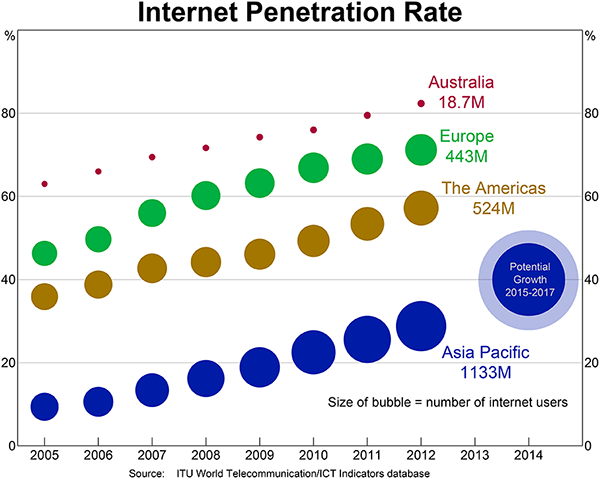Australia is missing out on the Chinese e-commerce boom
Australian businesses run the risk of missing out on the Asian internet boom, Sarv Girn, chief information officer at the Reserve Bank of Australia has warned.
Girn points out that internet penetration rates in Asia are very low, particularly when compared with Australia, but they are growing more rapidly than the rest of the world.

The projected growth of internet usage in the region suggests there is clearly a disruptive change coming, Girn said. If the increase continues over the next five years with penetration increasing from 30 to 40 per cent, the number of people on the internet will just about double.
The growth potential across the whole region is indeed staggering. India, which has the third largest online user base globally after China and the US, has an internet penetration rate of just 17.4 per cent.
According to eMarketer, consumers in the Asia-Pacific will spend more money online than the US for the first time ever this year. And for every ten US dollars spent, six will come from China.
The internet is proving to be the most vibrant and dynamic part of the new economy in China. The growth in the mobile market there has been phenomenal, thanks to infrastructure investment as well as the availability of low-cost smartphones and tablets.
According to official figures from the China Internet Network information Center, China has 618 million internet users as of December 2013. In other words, China has an online population 33 times that of Australia with only a 45.8 per cent penetration rate. Half of that population shops online.
Yet despite the huge opportunity for Australian businesses to sell directly to China’s rapidly expanding middle class via the web, our businesses are lagging behind the competition from other countries.
"There are a range of popular Australian brands sold on China's Tmall, but sales volumes are still small,” explains Ben Simpfendorfer, a Hong Kong-based investment banker at strategy consultancy Silk Road Associates.
E-commerce in China is already a fiercely competitive market, with most of the world’s brands looking to tap into the growing affluent classes there, says Simpfendorfer.
“Making your product available is just a first step. But it's hard to be noticed without an effective marketing strategy, especially a digital media strategy.”
A number of Australian brands such as Penfolds wine, dairy provider A2 Milk, baby food manufacturer Bellamy's Organic, and clothing store Jeanswest have their own shopfronts on Alibaba’s B2C website Tmall.
If that seems too daunting for Australian businesses, the process has recently been simplified thanks to a partnership between China’s e-commerce giant Alibaba and Australia Post.
Through the agreement, businesses no longer have to overcome onerous obstacles such as registering as a Chinese business entity or employing local staff in the country. Australian businesses now have the option of piggy-backing off Australia Post and shipping their products directly from Australia.
But while Australian businesses rush to catch up on this sales opportunity, they run the risk of missing the bigger picture.
“Be warned: those additional people on the internet will not just be buying, but also selling themselves, and disrupting markets globally” said Girn yesterday.
As if to hammer home the point, as Girn spoke, Alibaba was launching American shopping website 11 Main in a direct assault on established big players like Amazon, eBay and Walmart on their home turf.
The need for a China strategy is as much a defensive decision, not just offensive, says Simpfendorfer.
“Learning how to compete with Chinese companies in their home market will be critical as those same Chinese companies look to establish themselves in Australia.”
In America this week, Prime Minister Tony Abbott was making a different point entirely.
"A rich China doesn't mean a billion competitors so much as a billion new customers," Mr Abbott told an audience of business.
The reality is that they are both.
















